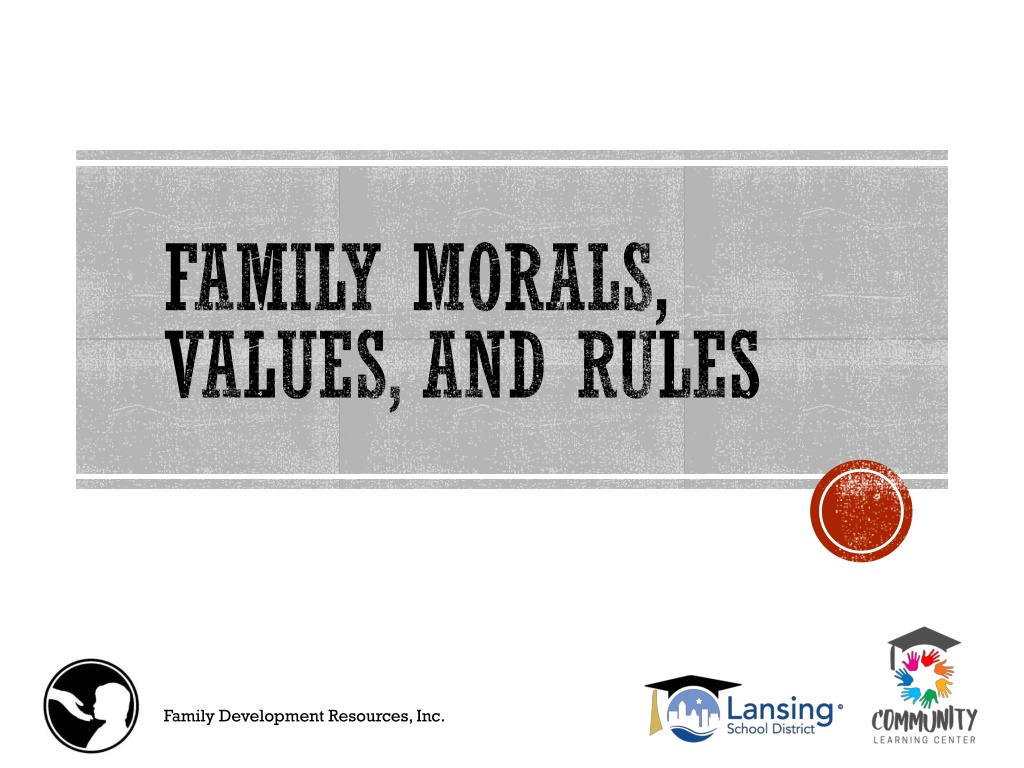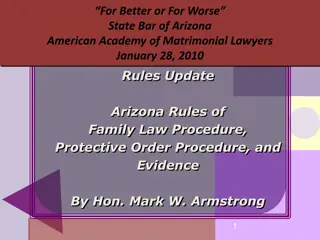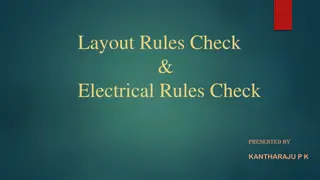Understanding Family Morals, Values, and Rules
Developing family morals and values is essential for guiding children and fostering a harmonious family environment. Morals, values, and rules play a crucial role in shaping individual behaviors and decision-making processes. By establishing family guidelines based on strong morals and values, parents can nurture a sense of responsibility, cooperation, and respect among family members. Understanding the distinction between morals and values helps in creating a conducive environment where everyone's input is valued.
Download Presentation

Please find below an Image/Link to download the presentation.
The content on the website is provided AS IS for your information and personal use only. It may not be sold, licensed, or shared on other websites without obtaining consent from the author. Download presentation by click this link. If you encounter any issues during the download, it is possible that the publisher has removed the file from their server.
E N D
Presentation Transcript
FAMILY MORALS, VALUES, AND RULES Family Development Resources, Inc.
DEVELOPING FAMILY MORALS AND VALUES Discipline comes from the Latin word discipulus, which means to teach and guide. The basis for teaching children discipline is in identifying a set of family morals and family values.
MORALS VERSUS VALUES Examples of Values If your value system is founded upon honesty, you would probably choose to study for a difficult test rather than cheating for a passing grade. However, if you value achievement and success over honesty, you may decide to cheat on the exam instead. This relates to which value is worth more to the individual. Examples of Morals We make moral decisions based on personal values all the time. An example of a moral in the example above is determined by a person's value of honesty:cheating is bad. Someone who values success more than honesty may behave by another moral:cheating is fine.
HOW MORALS ARE DEVELOPED Family Family morals are the beliefs that family members have about right and wrong, and good and bad. Media Siblings Parents School Peers Church 4
DEVELOPING VALUES: BELIEFS THAT HAVE WORTH Family values are the moral guidelines that family members believe have worth. For example, No hitting can be a value, because your family moral is to not physically harm someone. If a moral is to have worth, the entire family must practice it and believe in it for it to truly be a value.
WHY DO PEOPLE WHO KNOW RIGHT FROM WRONG CHOOSE TO DO THE WRONG THING ANYWAY? Knowing right from wrong is not enough in doing right from wrong. For morals to work, they need to have value, family value. ALL members of the family have to practice what they preach, or the words don t mean anything. If being cared for and gentle to others is a family moral, but parents model disrespect and violence to each other and their children, the moral has no value. Being cared for and gentle will not be a part of their children s lives.
THE PURPOSE OF FAMILY RULES The purpose of family rules is for parents and children to establish consistent guidelines that will help everyone know what is and what isn t expected of them. Family rules encourage family members to take responsibility for their own behavior and to be contributing members of the family. Family rules teach cooperation and make living together much more pleasant. Family rules help ensure that everyone in the family has input in how the family operates and the standards of acceptable behavior.
HOW TO ESTABLISH FAMILY RULES Get everyone to participate Have all family members sit around the table. Have young children be present, even if they can t contribute. Share problem behaviors Encourage everyone to share behaviors they feel are problems. Talk freely about issues the family has to work on. Avoid blaming or fault finding. Remember, the rules are the same for everyone, and everyone is treated fairly 8
HOW TO ESTABLISH FAMILY RULES Family rules are designed to promote and reinforce desirable behaviors, through parental modeling. Family rules involve Do s and Don ts. Do s Let children and adults know what IS appropriate behavior. Don ts Let children and adults know what is NOT appropriate behavior.
HOW TO ESTABLISH FAMILY RULES There is no need to have a rule for every thing, but rules should be made for the most important things such as: Safety Manners and politeness Daily routines and chores How you treat each other. No hitting or shouting at each other Curfews Alcohol and drugs Digital rules (screen time, online safety, etc.)
HOW TO ESTABLISH FAMILY RULES Brainstorm a list of rules Have children be active members in brainstorming rules. The goal is for parents to have the children come up with some of the rules they would like to see on the family list. Do s Don ts Keep the rules simple and specific Be specific in wording your rules. For every what not to do , there has to be a what to do. This way you re substituting what you want for what you don t want
HOW TO ESTABLISH FAMILY RULES Limit family rules to a maximum of five to seven Keeping a short list will help children remember the rules and practice them. The less the better! Identify a consequence and reward for each rule When children choose to misbehave, a consequence must follow. The consequence should be as closely related to the rule as possible. For example, if a child is caught on screens past the allowable time, a consequence might be that they lose an hour of screen time for the next day. Not that they lose allowance for a week. When children choose to behave, a reward must follow. 12
Hold regular family meetings to review the rules Rules are not written in concrete. When a behavior is no longer a problem, have a rule dropping party. The rule has now become a moral or value. When new problems come up, put it on the list of Do s and Don ts.























